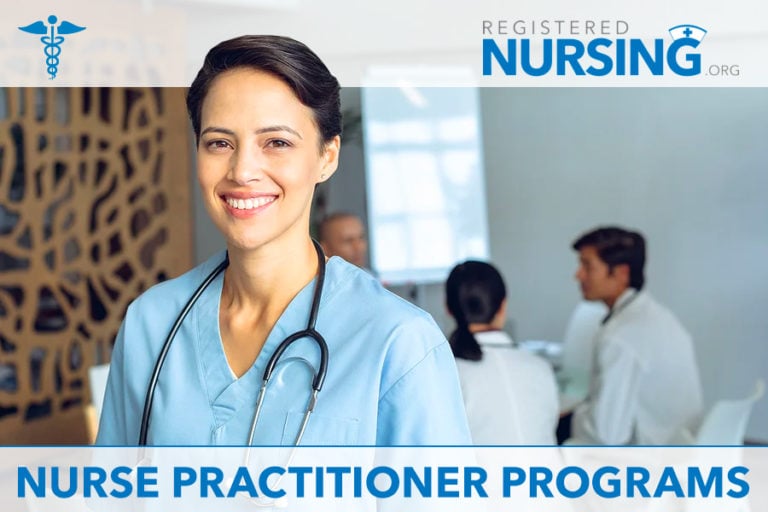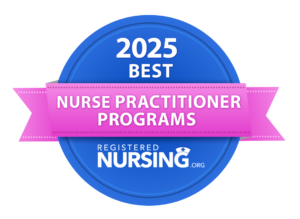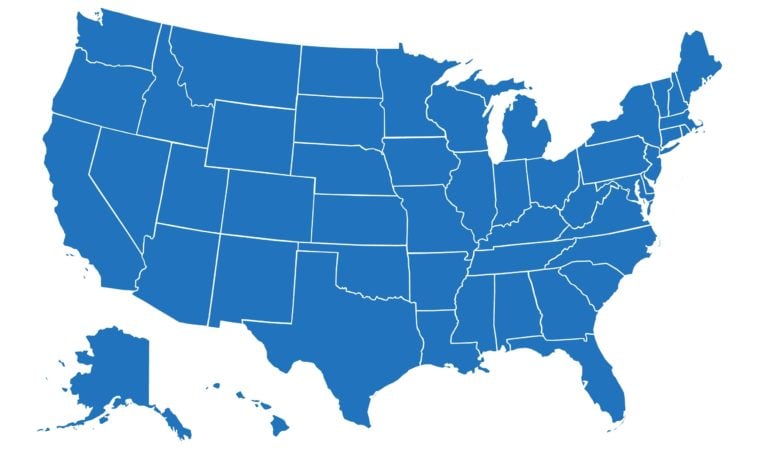Best Online Nurse Practitioner Schools & Programs
- 2025 - Best Online Nurse Practitioner Programs
- Find Nurse Practitioner Programs In Your State
- Popular Nurse Practitioner Program Specialties
- NP Degree Levels & Education Requirements
- Program Cost & Length: Online vs. Campus
- Getting Licensed and Certified as an NP
- Why Is Choosing an Accredited NP Program Important?
- Featured Online Nurse Practitioner Programs Now Enrolling Students

For many RNs with a few years of experience under their belts, advancing their careers with a Nurse Practitioner (NP) degree becomes an aspiration. However, the thought of returning to school to become an NP can be overwhelming. There's tuition, choosing an NP specialty, and deciding which program to enroll in. Luckily, online NP programs have made many of these considerations much more straightforward. Read on to learn everything you need to know about NP schools and programs.
Find Nurse Practitioner Programs Near Me.
2025 - Best Online Nurse Practitioner Programs

Choosing the right nurse practitioner program is a crucial step in advancing your nursing career. To help prospective students make informed decisions, we’ve ranked the Best Online Nurse Practitioner Programs based on factors such as accreditation, program flexibility, graduation rates, and cost. These programs provide the rigorous education and clinical training necessary to succeed in this high-demand field, all while offering the convenience of online learning. To learn more about our evaluation process, visit our methodology page, where we detail the criteria used in our rankings.
Maryville University
Maryville University's online Nurse Practitioner programs, offered through the Catherine McAuley School of Nursing, focus on providing cutting-edge education and real-world experience to prepare students for advanced clinical practice. With a strong emphasis on evidence-based practice and patient-centered care, Maryville's programs prepare nurses to meet the evolving needs of the healthcare industry and make a positive impact on patient outcomes.
DNP Programs- BSN to DNP: FNP (Family) Online/Hybrid
- DNP-NP: FNP (Family) Online/Hybrid
- BSN to DNP: AGACNP (Adult-Gerontology Acute Care) Online/Hybrid
- BSN to DNP: AGPCNP (Adult-Gerontology Primary Care) Online/Hybrid
- DNP-NP: AGACNP (Adult-Gerontology Acute Care) Online/Hybrid
- DNP-NP: AGPCNP (Adult-Gerontology Primary Care) Online/Hybrid
- BSN to DNP: PNP (Pediatric Primary Care) Online/Hybrid
- DNP-NP: PNP (Pediatric Primary Care) Online/Hybrid
- BSN to DNP: PMHNP (Psychiatric Mental Health) Online/Hybrid
- DNP-NP: PMHNP (Psychiatric Mental Health) Online/Hybrid
- FNP (Family) Online/Hybrid
- AGACNP (Adult-Gerontology Acute Care) Online/Hybrid
- AGPCNP (Adult-Gerontology Primary Care) Online/Hybrid
- PNP (Pediatric Primary Care) Online/Hybrid
- PMHNP (Psychiatric Mental Health) Online/Hybrid
- FNP (Family) Online/Hybrid
- AGACNP (Adult-Gerontology Acute Care) Online/Hybrid
- AGPCNP (Adult-Gerontology Primary Care) Online/Hybrid
- PNP (Pediatric Primary Care) Online/Hybrid
- PMHNP (Psychiatric Mental Health) Online/Hybrid

Spring Arbor University
Spring Arbor University offers a cutting-edge online Nurse Practitioner program through their School of Nursing, which is known for its commitment to holistic care and ethical practice. With a focus on evidence-based practice and hands-on clinical experience, students receive a comprehensive education that prepares them to become competent and compassionate advanced practice nurses in a rapidly evolving healthcare landscape.
Graduate Certificate Programs- Post-Master's Family Nurse Practitioner Certificate Online/Hybrid
- Online Post-Master’s AGPCNP Certificate Online/Hybrid
- Post-Master's Pediatric Nurse Practitioner Online/Hybrid
- Post Master's Psychiatric Mental Health NP Online/Hybrid
- MSN - Family Nurse Practitioner Program Online/Hybrid
- MSN - Adult-Gerontology Nurse Practitioner Program Online/Hybrid
- MSN - Pediatric Nurse Practitioner Program Online/Hybrid
- MSN - Psychiatric Mental Health Nurse Practitioner Online/Hybrid

Ohio University
Ohio University's online Nurse Practitioner programs, offered through the College of Health Sciences and Professions, provide students with a comprehensive education in advanced nursing practice. The programs focus on interprofessional collaboration, evidence-based practice, and leadership to prepare students for success in the evolving healthcare landscape. Faculty members are experienced practitioners who bring real-world expertise to the virtual classroom.
MSN Programs- Psychiatric Mental Health Nurse Practitioner Online/Hybrid
- Family Nurse Practitioner Online/Hybrid
- Adult-Gerontology Acute Care Nurse Practitioner Online/Hybrid

Drexel University
Drexel University's College of Nursing and Health Professions offers comprehensive online Nurse Practitioner programs that combine advanced clinical skills with evidence-based practice. The program, known as the Drexel University Nurse Practitioner-Individual Across the Lifespan, is designed to prepare students for leadership roles in healthcare delivery, with a focus on patient-centered care and interprofessional collaboration.
Graduate Certificate Programs- Online Emergency Nurse Practitioner Post-Masters Certificate Online/Hybrid
- Family Nurse Practitioner (Individual Across the Lifespan) Online/Hybrid
- Adult Gerontology Acute Care Nurse Practitioner Online/Hybrid
- Adult Gerontology Primary Care Nurse Practitioner Online/Hybrid
- Pediatric Acute Care Nurse Practitioner Online/Hybrid
- Pediatric Primary Care Nurse Practitioner Online/Hybrid
- Pediatric Primary Care/Pediatric Acute Care Nurse Practitioner Dual Program Online/Hybrid
- Psychiatric Mental Health Nurse Practitioner Online/Hybrid
- Women's Health/Gender Related Nurse Practitioner Online/Hybrid
- Family Nurse Practitioner (Individual Across the Lifespan) Online/Hybrid
- Adult Gerontology Acute Care Nurse Practitioner Online/Hybrid
- Adult Gerontology Primary Care Nurse Practitioner Online/Hybrid
- Pediatric Acute Care Nurse Practitioner Online/Hybrid
- Pediatric Primary Care Nurse Practitioner Online/Hybrid
- Psychiatric Mental Health Nurse Practitioner Online/Hybrid
- Women's Heath/Gender Related Nurse Practitioner Online/Hybrid

Clarkson College
Clarkson College offers highly acclaimed online Nurse Practitioner programs through the School of Nursing. Their philosophy is rooted in providing advanced education and clinical experiences to prepare students for the complex role of a Nurse Practitioner. With a strong emphasis on evidence-based practice and interprofessional collaboration, graduates are equipped to excel in their chosen field.
Graduate Certificate Programs- Family Nurse Practitioner Online/Hybrid
- Adult-Gerontology Primary Care Nurse Practitioner Online/Hybrid
- Psychiatric-Mental Health Nurse Practitioner Online/Hybrid
- Family Nurse Practitioner Online/Hybrid
- Adult Gerontology Acute Care Nurse Practitioner Online/Hybrid
- Psychiatric-Mental Health Nurse Practitioner Online/Hybrid

Browse through all the nurse practitioner programs offered by state. These include campus, online, and hybrid programs for all nurse practitioner specialties.

- AL Alabama
- AK Alaska
- AZ Arizona
- AR Arkansas
- CA California
- CO Colorado
- CT Connecticut
- DE Delaware
- DC Washington, DC
- FL Florida
- GA Georgia
- HI Hawaii
- ID Idaho
- IL Illinois
- IN Indiana
- IA Iowa
- KS Kansas
- KY Kentucky
- LA Louisiana
- ME Maine
- MD Maryland
- MA Massachusetts
- MI Michigan
- MN Minnesota
- MS Mississippi
- MO Missouri
- MT Montana
- NE Nebraska
- NV Nevada
- NH New Hampshire
- NJ New Jersey
- NM New Mexico
- NY New York
- NC North Carolina
- ND North Dakota
- OH Ohio
- OK Oklahoma
- OR Oregon
- PA Pennsylvania
- RI Rhode Island
- SC South Carolina
- SD South Dakota
- TN Tennessee
- TX Texas
- UT Utah
- VT Vermont
- VA Virginia
- WA Washington
- WV West Virginia
- WI Wisconsin
- WY Wyoming
Popular Nurse Practitioner Program Specialties
NPs have the opportunity to specialize in an area of care, focusing their efforts on a specific patient population or environment. Click on each of these popular NP specialty programs to learn more.

Acute Care Nurse Practitioner (ACNP) Programs
Prepares nurses to provide advanced care for critically ill or injured patients.
Adult-Gerontology Nurse Practitioner (AGNP) Programs
Trains nurses to provide comprehensive care for adults and the elderly.
Family Nurse Practitioner (FNP) Programs
Emphasizes primary care across the lifespan - from infancy to adulthood.
Pediatric Nurse Practitioner (PNP) Programs
Provides training to deliver advanced care to babies, children, and adolescents.
Psychiatric Nurse Practitioner (PMHNP) Programs
Prepares nurses to provide care for various mental health conditions.
Women's Health Nurse Practitioner (WHNP) Programs
Provides training for specific women's health issues from adolescence onward.
Other NP Specialties
While the popular NP specialties above are often offered as concentrations in NP degree programs, there are other specializations that aspiring NPs can pursue. Think of these as sub-specialties – for example, if you get your degree in Acute Care, you may wish to pursue Emergency or Critical Care NP roles. In some cases, you may be able to enter specialty tracks or take focused courses for these alternative specializations. Check out the list below to learn more:
- Oncology Nurse Practitioner
- Emergency Nurse Practitioner
- Neonatal Nurse Practitioner
- Cardiology Nurse Practitioner
- Critical Care Nurse Practitioner
- Dermatology Nurse Practitioner
- Holistic Nurse Practitioner
NP Degree Levels & Education Requirements
There are several degree routes a nurse can take to become a nurse practitioner. The most common educational routes to a nurse practitioner career are the two-year Master’s of Science in Nursing (MSN) and the three- to four-year Doctor of Nursing Practice (DNP). While both degree levels are offered online, come in various specializations, and will leave you eligible for NP licensure and certification, there are several pros and cons to each. Compare them below to determine which program type is right for you.
Pros and Cons of an MSN NP Degree
Advantages
- Typically completed in 2-3 years, quicker than a DNP
- Cheaper tuition than DNP programs
- Wide range of NP specialties available
- Accelerated options provide a quicker path to becoming an NP
Disadvantages
- Some regions/specialties may shift towards requiring a DNP
- Fewer chances for leadership and administrative roles
- Focuses more on clinical practice than research
- Not as much emphasis on healthcare policy compared to DNP
Pros and Cons of a DNP NP Degree
Advantages
- Higher salaries than MSN-prepared NPs
- More leadership, academic, and research roles available
- Emphasizes evidence-based practice and healthcare policy
- Aligns with increasing calls for the DNP as the standard for NPs
Disadvantages
- Typically completed in 3-4 years - longer than MSN programs
- More expensive tuition than MSN programs
- Some positions accept MSN-prepared NPs, making DNP optional
- Involves more extensive coursework and clinical hours
Nurse Practitioner Bridge Programs: RN to NP, BSN to DNP
Nurse Practitioner bridge programs are accelerated educational pathways that allow nurses to advance their qualifications without following a traditional academic route. These programs are often quicker and more affordable than completing numerous graduate-level degrees, but can be quite intensive in nature. In some cases, coursework can be completed online. Compare these two bridge programs further:
| Program | Main Entry Requirements | Outcome Degree | Length | Career Goals |
|---|---|---|---|---|
| RN to NP | RN license, ADN or diploma | MSN or DNP | 3-4 years (part-time) | Advanced practice, primary care NP |
| BSN to DNP | RN license, BSN | DNP | 3-4 years | Advanced clinical roles, leadership |
For those who already have a graduate-level nursing degree and want to enter or switch to a new nurse practitioner specialty, a one-year NP post-master’s certificate is a streamlined educational pathway. While not a standalone degree, these certificate programs are offered in numerous NP specialties and can eliminate the need to complete another full graduate degree program.
Accelerated NP Degree Programs
If you don’t have a nursing degree but want to become an NP quickly, two main programs exist: the accelerated MSN, and the Master’s Entry to Nursing Practice (MENP). The difference between these two programs is that the accelerated MSN leads to a general MSN, while the MENP (also sometimes called a direct-entry MSN) allows for specialization as a nurse practitioner other Advanced Practice RN (APRN). Check out more details below:
| Program | Who It’s For | Main Entry Requirements | Program Length | Outcome |
|---|---|---|---|---|
| Accelerated MSN | Non-nursing bachelor's degree | Bachelor's degree (non-nursing) | 18-24 months | RN licensure, MSN degree |
| MENP | Non-nursing background, any major | Bachelor's degree (any field) | 2-3 years | RN licensure, MSN degree, NP focus |
Program Cost & Length: Online vs. Campus
The cost of nurse practitioner programs varies widely, with options ranging from cheap to more expensive depending on the degree level, location, and whether the program is online or campus-based. Online NP programs tend to offer more flexible and affordable tuition rates, particularly for out-of-state students, who often pay less than they would for an in-person program. Campus-based programs, while sometimes more costly, may offer hands-on support and resources that some students find beneficial.
NP program length can also differ between online and campus-based programs. Many online programs are flexible and offer asynchronous coursework, meaning that students can potentially move through their courses more quickly than campus-based programs.
Compare the length and tuition fees of the most common NP degree programs below:
| NP Degree | Average Length | Average Tuition Range |
|---|---|---|
| MSN | 2-3 years (part-time/full-time) | $30,000 – $60,000 (total) |
| DNP | 3-4 years (post-BSN) | $40,000 – $100,000 (total) |
Getting Licensed and Certified as an NP
The process of becoming a licensed and certified Nurse Practitioner (NP) involves several key steps, each of which ensures that NPs are well-prepared for advanced practice. It’s imperative that you review your specific state’s process for granting and maintaining licensure, as well as your NP specialty’s certification process. Here’s an overview:
- Complete an NP Program:
- Enroll in an accredited NP program at the Master's (MSN) or Doctorate (DNP) level.
- Complete required coursework and clinical hours (usually between 500-1,000 hours depending on program requirements and specialty).
- Obtain National NP Certification:
- Choose a certification exam based on your NP specialty (e.g., Family, Acute Care, Pediatrics).
- Register and prepare for the exam through a recognized certification organization, such as:
- Pass the exam to become certified, which confirms your competence in your chosen specialty.
- Apply for State Licensure:
- Submit a licensure application to the state board of nursing where you plan to practice.
- Provide proof of education, certification, and any required clinical hours completed.
- Undergo a background check if required by the state.
- Fulfill State-Specific Requirements:
- Complete additional exams if required by the state.
- Meet continuing education (CE) requirements for both licensure and certification, as each state and certifying body has unique requirements for license renewal.
- Maintain Certification and Licensure:
- Renew national certification every 5 years by meeting continuing education and clinical practice requirements.
- Renew state NP license as required, usually every 1-2 years, by demonstrating ongoing education and practice.
Learn more about RN licensure.
Why Is Choosing an Accredited NP Program Important?
Choosing an accredited nurse practitioner degree program is crucial for ensuring that the education received meets high standards of quality and prepares graduates for licensure and practice. Accreditation assures prospective students that the program has been evaluated by recognized accrediting bodies for its curriculum, faculty qualifications, and student outcomes. Graduating from an accredited program is often a requirement for certification and licensure, affecting a nurse’s ability to practice. Common accrediting bodies for NP programs include the Commission on Collegiate Nursing Education (CCNE) and the Accreditation Commission for Education in Nursing (ACEN). Selecting a program accredited by these organizations helps ensure that graduates are well-prepared for their careers and can provide safe, effective patient care.
